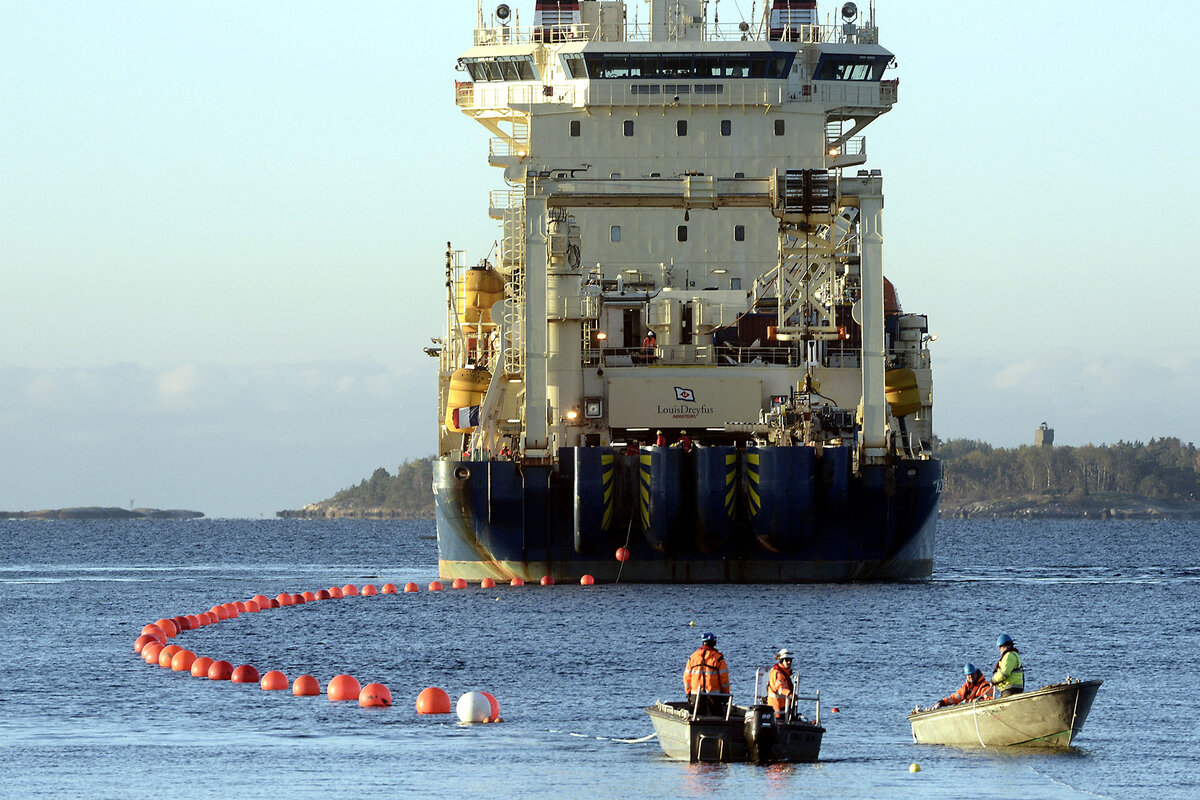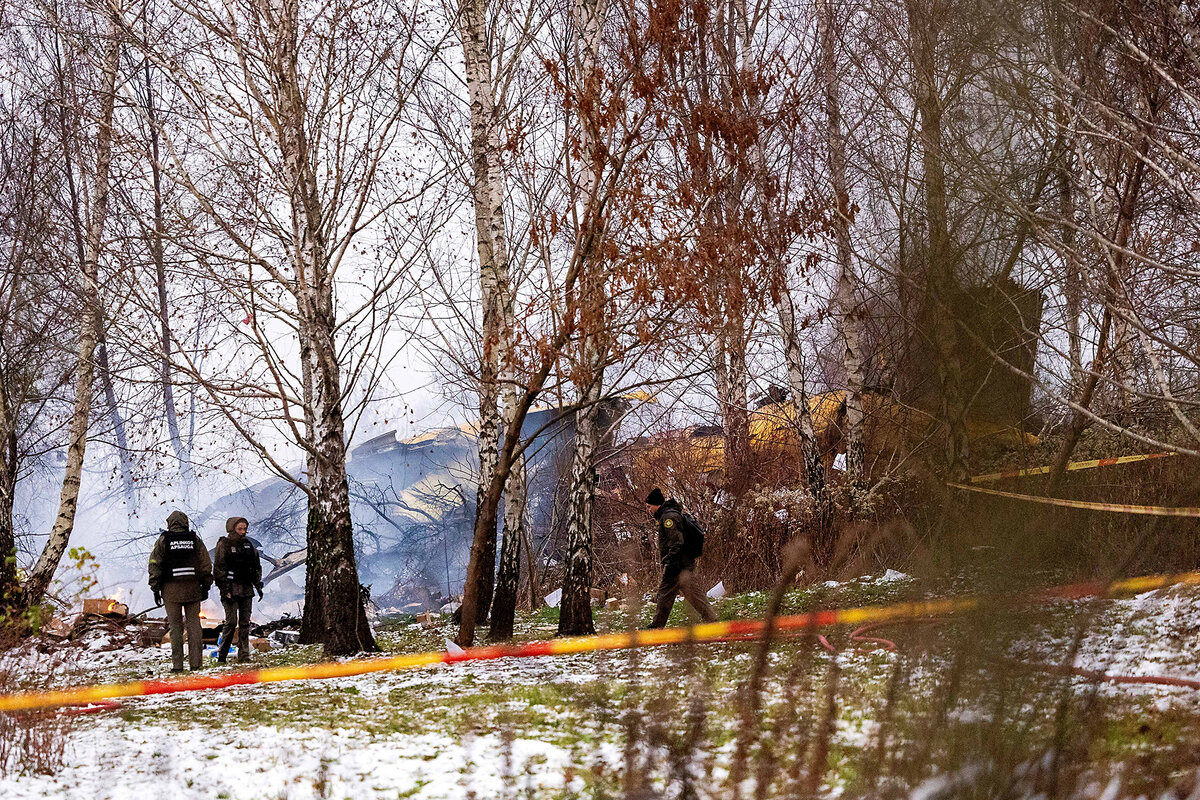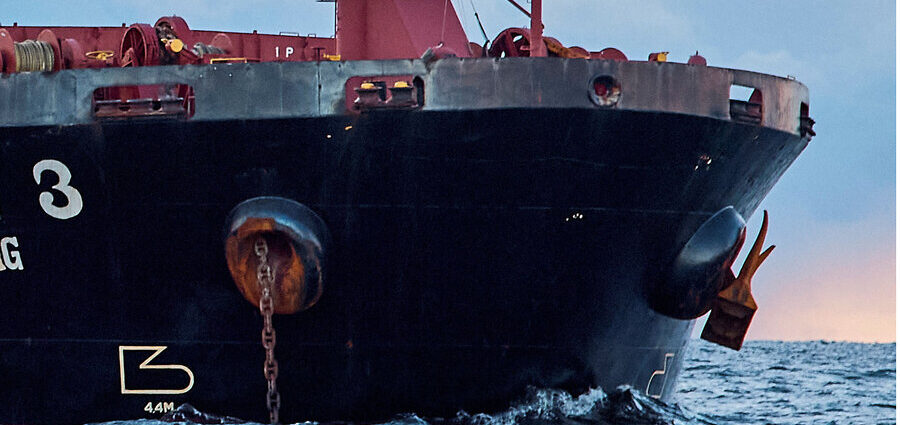Western intelligence specialists have been sounding the alarm for months about Russian sabotage in Europe.
In past days, however, Moscow’s suspected campaigns to do everything from infiltrating U.S. military bases to jamming GPS and downing planes have reached “staggeringly reckless” levels, the head of the British intelligence service MI6 recently warned.
Why We Wrote This
Recent instances of suspected sabotage in Europe don’t necessarily have proven ties to Russia. But it is clear that Vladimir Putin makes a strategy of churning up uncertainty and fear.
That was shortly before a Chinese cargo ship departing Russia dragged its anchor last week, cutting communication cables on the accommodatingly flat, shallow Baltic Sea and raising concerns that Moscow could be teaming up with Beijing to create further chaos.
Western allies will “step up” to address the sabotage, NATO Secretary-General Mark Rutte said during a meeting of the alliance’s foreign ministers on Tuesday. “We cannot be naive,” he said.
Though it is clear that Russian President Vladimir Putin, a former spy, makes a strategy of churning up uncertainty and fear, including through nuclear saber-rattling, it is possible that some of these latest suspected attacks were accidents, security analysts say.
Still, even if there isn’t overt collusion, experts add, anything that creates damage and disruption in the West – and riles up its leaders in the process – is in the shared interest of China and Russia.
Western intelligence specialists have been sounding the alarm for months about Russian sabotage in Europe.
In past days, however, Moscow’s suspected campaigns to do everything from infiltrating U.S. military bases to jamming GPS and downing planes have reached “staggeringly reckless” levels, the head of the British intelligence service MI6 recently warned.
That was shortly before a Chinese cargo ship departing Russia dragged its anchor last week, cutting communication cables on the accommodatingly flat, shallow Baltic Sea and raising concerns that Moscow could be teaming up with Beijing to create further chaos.
Why We Wrote This
Recent instances of suspected sabotage in Europe don’t necessarily have proven ties to Russia. But it is clear that Vladimir Putin makes a strategy of churning up uncertainty and fear.
Western allies will “step up” to address the sabotage, NATO Secretary-General Mark Rutte said during a meeting of the alliance’s foreign ministers on Tuesday. “We cannot be naive,” he said.
Though it is clear that Russian President Vladimir Putin, a former spy, makes a strategy of churning up uncertainty and fear, including through nuclear saber-rattling, it is possible that some of these latest suspected attacks were accidents, security analysts say.
“It’s going to be rare that you’ll find the smoking gun,” says Keir Giles, a Russian military expert and senior consulting fellow at Chatham House, a London think tank.
Still, even if there isn’t “actual, overt collusion,” anything that creates damage and disruption in the West – and riles up its leaders in the process – is in the shared interest of China and Russia, he adds. “So we shouldn’t be particularly surprised if they’re looking at each other and thinking, ‘Yeah, this is OK.’”
Undersea drones as “streetlights”
Spies don’t generally seek out the spotlight. Still, as in the United Kingdom, Germany’s chief intelligence officer, Bruno Kahl, came forward in a public hearing to alert lawmakers to Kremlin efforts to drive U.S. military forces from Europe.
Mr. Putin is also determined to “test the West’s red lines” through espionage and sabotage, Mr. Kahl said.

Lehtikuva/Heikki Saukkomaa/Reuters/File
The C-Lion1 submarine telecommunications cable is being laid to the bottom of the Baltic Sea by cable ship Ile de Brehat on the shore of Helsinki Oct. 12, 2015.
To this end, Russia has taken to using amateur operatives for “snooping around Europe and causing mischief in all of our backyards,” raising the risk of accidental run-ins, Gen. Darryl Williams, head of U.S. Army forces in Europe and Africa, said in October.
MI6 Chief Richard Moore, put it another way: Russian intelligence services, he said, have gone “a bit feral.”
Particularly in more pacifist-learning Germany, some grumbled that these warnings are alarmist. But the point is getting the word out to the general public – with a dash of psychological operations, or psyops.
After all, the recruitment of delinquents shows the desperate lengths Moscow must now go to with the Ukraine war draining its resources, Western intelligence officials point out.
They add that potential recruits may be being duped into activities more dangerous and consequential than they realize.
“Russia is actively looking for low-level criminals to use to do some sabotage actions and stuff,” says Julian Pawlak, research associate at the University of the Federal Armed Forces Hamburg in Germany.
“They don’t need to be against the West or anything,” he adds. “But of course, behind this is a bigger picture, a bigger plan.”
Such public awareness campaigns, like those launched post-9/11, have proved to be successful in the past, says Mr. Giles, who adds that people are more invested in vigilance when the safety of their water supply, plane travel, and connectivity is at stake.
Adm. Pierre Vandier, a top strategic thinker for NATO in Norfolk, Virginia, told Defense News this week that, among other military moves, NATO is planning a network of underwater drones to act as “streetlights,” or CCTV cameras of sorts, to record criminal mischief in oceanic trouble spots.
Better defending critical infrastructure has been a need “known to militaries and researchers, but it was not on the political agenda,” Mr. Pawlak says. Now, he adds, that’s starting to change.

Lukas Balandis/BNS/Reuters
Rescuers work near the wreckage of the DHL cargo plane at the crash site near Vilnius International Airport in Lithuania Nov. 25, 2024.
Uncertainty around a plane crash and an undersea cable
In the meantime, investigations into suspected sabotage continue. U.S. military bases across Europe were put on heightened alert for the first time in a decade this summer, reportedly after intelligence surfaced that Russia was plotting attacks on them.
Mr. Putin has denied engaging in sabotage, but sources close to the Kremlin have suggested that Moscow would be justified in attacking U.S. concerns in Germany, Poland, and Romania given that the White House allowed Ukraine to use U.S. long-range missiles to strike across the border into Russia.
Berlin was already looking into fires caused by incendiary devices hidden in packages at a DHL warehouse in Leipzig, Germany, when a DHL cargo plane crashed in Vilnius, Lithuania, last week, killing one crew member.
The crash was immediately suspected of being an act of Russian sabotage.
But Lithuania’s defense minister – no fan of Mr. Putin – said last week that the initial investigation instead indicates a technical malfunction.
As for the anchor-dragging Chinese vessel that cut internet links between Sweden and Lithuania last month, “Nobody believes that these cables were accidentally cut,” German Defense Minister Boris Pistorius said.
The case echoed a similar episode last year, when a Chinese container ship, also dragging its anchor over the Baltic Sea bed, severed a Russian fiber-optic cable.
The vessel’s location points to a potential accident or a “red-on-red fratricide” of sorts, says Mr. Giles.
In fact, he notes, most of the estimated 150 to 200 cable breaks of similar scale around the world each year are accidents.
Focusing on the Baltic Sea as a past and potential future target for Russia means that “Anything that happens there gets a lot of attention,” Mr. Giles says. “But let’s not rule out that this could simply be wild incompetence rather than actual, deliberate conspiracy.”

